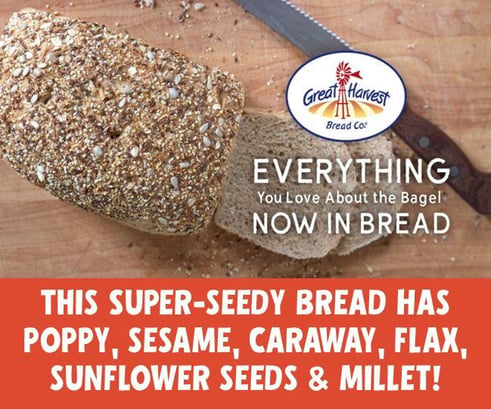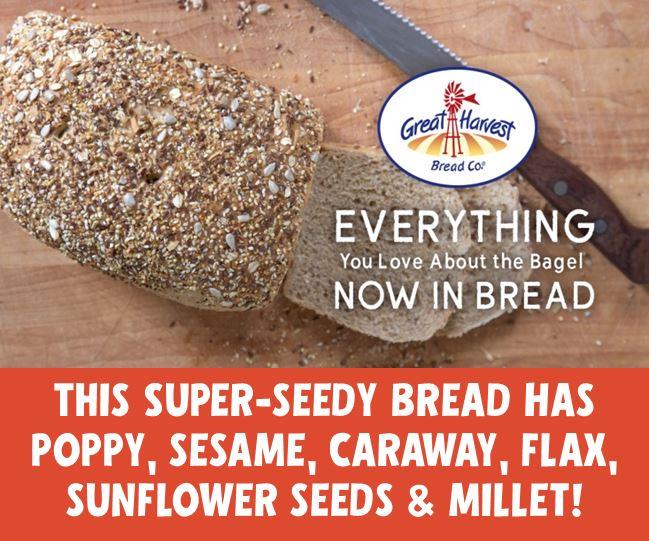One Christmas when I was young, my dad gave me a button that read, “Petite but Powerful.” I thought it was pretty cool and would wear it around with pride. That slogan came to mind the other day when I was sprinkling some pepita seeds on my salad. Seeds are small, but they can pack a lot of punch.
Here’s a look at the nutritional benefits of five seeds we typically use in our bakeries.
 Pepita Seeds
Pepita Seeds
Pepitas are hulled pumpkin seeds. Unlike some other pumpkin foods, they are much more than a seasonal treat. One ounce, or about three tablespoons of pepita seeds, contains vitamin E, heart-healthy poly and monounsaturated fats, 10 grams of protein and 15% and 35% of your Daily Value for iron and magnesium, respectively.
Poppy Seeds
Poppy seeds are often viewed as an ingredient used for its visual appeal, but don’t let that pretty face fool you. They have beauty and substance. An ounce of poppy seeds (about 3 1/3 tablespoon) offers five grams of protein, six grams of fiber, and 30% of your Daily Value of calcium. They are also a good source of thiamin and iron and are high in magnesium and zinc.
Sesame Seeds
Sesame seeds are more than a decorative topping for your hamburger bun. One ounce, or just over three tablespoons of sesame seeds, provides five grams of protein, 11 grams of unsaturated fats, and is also an excellent source of calcium, iron, niacin, magnesium, zinc, and selenium.
Sunflower Seeds
Sunflower seeds are one of the most common seeds on the market, but the nutrition they provide is anything but. One ounce of sunflower seeds provides six grams of protein, and 70% of your Daily Value of the antioxidant vitamin E. They are also an excellent source of magnesium, zinc, and selenium.
Hemp Seeds
Hemp seeds, like our favorite ancient grain quinoa, is one of the rare few plant foods that offers a complete protein—meaning it contains all nine essential amino acids necessary to build proteins in the body. This nutty flavored seed also provides about two grams of fiber for every two tablespoons of seeds, which promotes digestive health. Hemp seeds are also a source of vitamin E, an antioxidant, as well as other trace minerals. These five tiny seeds are powerful and packed with nutritional value, despite their tiny size. Next time you eat something topped with crunchy, flavorful seeds, take a moment to appreciate all that they are contributing to your health!
Learn about another tiny nutritional powerhouse (spoiler: it’s our favorite one…yep, the wheat kernel) in our Guide to Whole Grains:
Editor’s note: We are sad to announce that this is Melissa’s last post for The Bread Business Blog, as she is leaving Great Harvest. Though she and her blogs will be missed by our readers and the extended Great Harvest family, we wish her the best in her next chapter! Read on for her parting words.
 A Personal Farewell from Melissa:
A Personal Farewell from Melissa:
When I first started at Great Harvest at the end of 2010, I was blown away by how kind and welcoming everybody in the office was. As I got to know everyone, I realized the office had many genuine, hardworking, passionate, witty, intellectual, and creative individuals who all had a great sense of humor. These traits are what make Great Harvest such a cool company. I have felt honored to be working alongside these individuals over the past six years and have learned a lot while I have been here. I will always cherish the experiences, the cameraderie, and of course the friendships Great Harvest Franchising, Inc. has given me.
This past August I was blessed with a beautiful daughter. I know how fast those precious years can fly by, which is why I have decided to leave Great Harvest and create a situation where I can be with her. It has been a pleasure sharing knowledge about the fresh ingredients and whole grains Great Harvest has to offer and writing blogs for you all over the years. I wish you all a happy, healthy journey in life!





